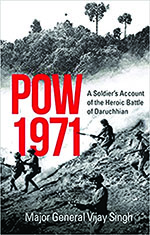There are three special things about the book under review, the last two of which are interconnected. To begin with the first: its description of a battle for Daruchhian between its well-entrenched Pakistani defenders and an Indian infantry battalion of the Grenadier Regiment. Daruchhian is a hill feature across from Poonch on the Pakistan Occupied Kashmir side of the Ceasefire Line—as the Line of Control (LC) was termed then. Since Daruchhian by virtue of its location posed a threat for the defences at Poonch, the Indian army decided to take it over to secure Poonch better. The Pakistanis, equally convinced of the importance of Daruchhian to their plans, were determined to put up a fight for the hill. This led to one of the fierce battles of the 1971 War.
Whereas the 1971 War is known more for what happened on the eastern front, arguably the more fierce encounters between the two sides were fought on the western front. The Pakistanis, defending their mainland as against their colony, East Pakistan, gave a better account of themselves on the western front. They had also promised the East Pakistan defenders that the defence of East Pakistan lay in West Pakistan and therefore were more prepared on the western front. For its part, the Indian Army had been directed to merely force the Pakistanis on the back foot on the western front, lest Pakistanis send in troop reinforcements to help their beleaguered uniformed brethren in East Pakistan. Therefore, in a way, the Pakistanis had the upper hand psychologically to begin with, with the Indians fighting with a limited purpose and the Pakistanis putting up what to them may have appeared an existential fight. This partially accounts for the stalemate on the western front, which, of course, in no way detracts from the blood and moral pressure that the frontline troops expended in gaining their objectives.
The Battle of Daruchhian was one such battle in which fully motivated Pakistani soldiers expectantly awaited an Indian attack and when it did materialize, gave a fearsome reply. The Indian tactical level attack ended up a relative failure, though the Grenadiers compensated with gumption for the lapses in tactical planning and leadership that were revealed as the plan for capture of Daruchhian went awry. The book excels in its first part, dissecting what fell apart, with an unvarnished search for the truth. The details are of interest to men in uniform, especially the younger lot. No doubt, though 50 years since it was fought, lessons are being learnt from this particular battle since the author—son of the war hero Major Hamir Singh—currently heads the senior command faculty at the Army War College, Mhow, that trains the army’s prospective battalion commanders..

